|
|
|
Sort Order |
|
|
|
Items / Page
|
|
|
|
|
|
|
| Srl | Item |
| 1 |
ID:
173463


|
|
|
|
|
| Summary/Abstract |
This article uses the mean age at menarche of women in China as an indicator of changes in the standard of living during the 20th century. It discusses the difficulties of using this indicator. It finds that the mean age of menarche stagnated at 16 to 17 years for women born during the period between the 1880s and 1930s. The age at menarche decreased in some urban areas, indicating improving living standards in, for example, Beijing and Shanghai. The mean age at menarche increased for 1940s’ birth cohorts, in relation not only to the warfare of the 1940s but also the famine of 1959–1962. The mean age at menarche decreased in a sustained way for women born during the 1950s to early 2000s. The decrease is associated with increasing educational attainment since the 1940s and also improvements in nutrition, hygiene and healthcare.
|
|
|
|
|
|
|
|
|
|
|
|
|
|
|
|
| 2 |
ID:
173460
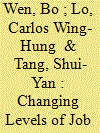

|
|
|
|
|
| Summary/Abstract |
As a result of multiple waves of administrative reforms in the past three decades, China's civil service has become more professionalized. Yet public employees appear to have become increasingly dissatisfied in recent years. Based on questionnaire surveys and interviews with environmental enforcement officials in a southern city, this paper traces changes in the job satisfaction levels of these officials between 2000 and 2014. It shows that satisfaction with the extrinsic rewards received and overall job satisfaction declined during this period. These downward trends partly reflected the increasingly challenging institutional environments faced by the officials: rising political and societal demands, inadequate fiscal and personnel resources, and limited enforcement authority. In addition, as the officials became more highly educated and professionalized, mission match became a stronger antecedent of job satisfaction. These findings suggest the importance of meeting the motivational needs of a more professionalized workforce.
|
|
|
|
|
|
|
|
|
|
|
|
|
|
|
|
| 3 |
ID:
173462
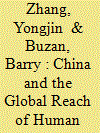

|
|
|
|
|
| Summary/Abstract |
This article examines the complex dialogical relationship between China and the global reach of human rights. It charts the transformation of China from a human rights exception and a human rights pariah state to an active participant in, and shaper of, global human rights governance. It looks at such transformation as dynamic social and political processes full of contradictions and the negotiated outcome of China's communicative engagement with “moral globalization” in a world morally divided on the meaning of human rights. It contends that the global reach of human rights understood as advancing rather than perfecting global justice will always remain contentious, as it is contingent on the possibility of open public reasoning across cultures and national boundaries in a global moral conversation. It also argues that China has resourcefully used the idiom of human rights for two specific purposes. One is to justify and rationalize its “developmental relativism” as an excuse for practices that condone continued political repression in China; the other is to internalize politics of contestation within the institutions of global human rights governance by shifting the centre of gravity of both the normative debate and the practical application of human rights.
|
|
|
|
|
|
|
|
|
|
|
|
|
|
|
|
| 4 |
ID:
173464
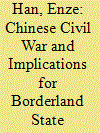

|
|
|
|
|
| Summary/Abstract |
Few studies on the legacies of the Chinese Civil War have examined its effects on state consolidation in the borderland area between China and mainland South-East Asia. This paper empirically examines the impact of the intrusion of the defeated Kuomingtang (KMT) into the borderland area between China, Burma and Thailand. In the People's Republic of China (PRC), the presence of the US-supported KMT across its Yunnan border increased the new communist government's threat perceptions. In response, Beijing used a carrot-and-stick approach towards consolidating its control by co-opting local elites while ruthlessly eliminating any opposition deemed to be in collusion with the KMT. In the case of Burma, the KMT presence posed a significant challenge to Burmese national territorial integrity and effectively led to the fragmentation of the Burmese Shan State. Finally, in Thailand, Bangkok collaborated with the Americans in support of the KMT to solidify its alliance relations. Later, Thailand used the KMT as a buffer force for its own border defence purposes against a perceived communist infiltration from the north. This paper contextualizes the spill-over effects of the Chinese Civil War in terms of the literature on how external threats can potentially facilitate state consolidation.
|
|
|
|
|
|
|
|
|
|
|
|
|
|
|
|
| 5 |
ID:
173459


|
|
|
|
|
| Summary/Abstract |
This article explores the discursive functioning of education policies, bringing into consideration community perspectives regarding policy enactment in contemporary China. With the intention of building upon ongoing discussions surrounding both the conceptions and purposes of policy sociology, we critically analyse policies directly related to the education of migrant children living in and around China's largest urban centres, with a specific focus on those implemented in Beijing. We emphasize two important aspects that previous studies of China's education policies have tended to underplay given their focus on social-economic perspectives. The first argument is that education policies have an underlying agenda that extends beyond that of simply addressing the educational needs of migrant children – evidenced through the discursive functions of policy texts. The second argument is related and seeks to raise questions about who is best served by these policies and for whom these policies are intended.
|
|
|
|
|
|
|
|
|
|
|
|
|
|
|
|
| 6 |
ID:
173457
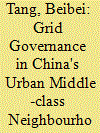

|
|
|
|
|
| Summary/Abstract |
This article examines the so-called “grid governance” scheme, a widely used grassroots governance strategy implemented in urban China in recent years. Drawing on data collected in multiple cities from 2011 to 2016, it analyses in what ways, and to what extent, the state employs the grid governance scheme to resolve neighbourhood conflicts and reinforce governance in Chinese urban middle-class neighbourhoods. The findings highlight complex interactions under the scheme among the residents, the state and market actors in neighbourhood governance, including the resident volunteers, residents’ social groups, residents’ committees and property management companies. By coopting middle-class resident volunteers, maximizing the existing political influence of the retired urban elites, and establishing Party organizations in middle-class residential communities, the grid governance scheme has become a major vehicle for resident mobilization and conflict resolution, and a key governance mechanism to reinforce the Party's leadership in middle-class neighbourhoods.
|
|
|
|
|
|
|
|
|
|
|
|
|
|
|
|
| 7 |
ID:
173466
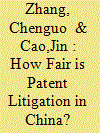

|
|
|
|
|
| Summary/Abstract |
By conducting field research and analysing judgments delivered in Beijing courts from 2004 to 2011, we find that the popular notion held by China's trade partners of the inadequacy of intellectual property protection is only partly supported by the empirical evidence. The likelihood of winning lawsuits is higher for foreign than domestic plaintiffs and the extremely low damages ruled by Chinese courts are due to particular causes. Courts lack consistent methods to calculate incurred losses in intellectual property right (IPR) infringements and consequently routinely apply the statutory damages whose upper limit is restricted by legislation. Efforts by Chinese legislators to enhance compensation by lifting the upper limit of awardable statutory damages in the Third Amendment of Chinese Patent Law (2008) did not seem to have an effect on our sample. Chinese policymakers should instead focus on the cause of the issue by providing more implementable guidelines for courts to calculate losses. Courts need to develop applicable conventions for calculating damages, based on objective criteria of how much compensation ought to be payable, which is also the basis of calculating reasonable statutory damages. Thus, the new provision of the “right of information” on pirated goods proposed by the ongoing Fourth Amendment provides a significant weapon to combat counterfeiting.
|
|
|
|
|
|
|
|
|
|
|
|
|
|
|
|
| 8 |
ID:
173458
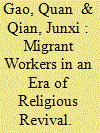

|
|
|
|
|
| Summary/Abstract |
In the reform era, China appears to be caught in a contradictory dual process – the entrenchment of secular values and simultaneously, the notable revival of all forms of religion. However, the existing literature has achieved limited success theorizing how the thriving of faiths constitutes, and co-evolves with, secular modernity and capitalism. This article contributes to this re-theorization by bringing migration, labour and industrial capitalism to bear on faith and religious practices. Our empirical study in Shenzhen focuses on the formation of rural-to-urban migrant workers’ Christian faith. We examine the ways in which migrant workers manoeuvre religion as a cultural, symbolic and discursive resource to come to terms with, but also sometimes to question and counteract, the double exploitation enforced by state regulation and labour relations. In the meantime, however, this article also argues that migrants’ efforts in self-transformation through the discourses of benfen and suzhi, and their theologically mediated interpretation of alienation, labour exploitation and social inequality, overlap with, and reinforce, the agenda of producing docile, productive bodies of migrants, an agenda endorsed by the state–capital coalition. This research opens new opportunities for theorizing how capitalist secularity and religious orientation implicate one another in the current Chinese society.
|
|
|
|
|
|
|
|
|
|
|
|
|
|
|
|
| 9 |
ID:
173465


|
|
|
|
|
| Summary/Abstract |
Immediately following the Battle of Chamdo in October 1950, during the period between November 1950 and April 1951, the leaders of the new People's Republic of China (PRC) had two priorities in regard to Tibet. The first was to persuade the Tibetan government to send delegates to Beijing as soon as possible in order to start “negotiations,” and the second was to prevent the Dalai Lama from fleeing Tibet. Using Chinese documents that offer a new version of the process that led to these “negotiations,” this study, without addressing the international issues in detail, illustrates how the leaders of the PRC, either with promises, threats or even by bluff, were able to attain their goals.
|
|
|
|
|
|
|
|
|
|
|
|
|
|
|
|
| 10 |
ID:
173461
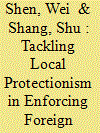

|
|
|
|
|
| Summary/Abstract |
In an effort to fight against local protectionism in court enforcement proceedings, China's Supreme People's Court (SPC) promulgated its “Notice on relevant issues pertaining to the people's court handling foreign and foreign-related arbitration” in 1995. Pursuant to this Notice, all Intermediate People's Courts have to report to the SPC and obtain its approval for any decision not to enforce a foreign or foreign-related arbitral award. However, the effectiveness of this internal reporting mechanism in constraining local protectionism has never been empirically tested. This study is based on 98 publicly available non-enforcement reply opinions rendered by the SPC after lower courts have made and reported preliminary non-enforcement decisions. It analyses whether these non-enforcement decisions show any pattern of local protectionism. Statistical results do not suggest that local protectionism is a major barrier hindering effective enforcement of foreign or foreign-related arbitral awards in China. We therefore contend that this internal reporting system may serve other functions by providing an alternative tool to reinforce judicial oversight in spite of China's weak appellant system. At the same time, the Chinese government seems to rely on this internal reporting system to achieve important policy goals. In this sense, analysing the functionality of this internal reporting system offers insights into this mechanism for top-level judicial control.
|
|
|
|
|
|
|
|
|
|
|
|
|
|
|
|
| 11 |
ID:
173455
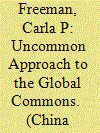

|
|
|
|
|
| Summary/Abstract |
This study assesses China's approach to the global commons, those areas of the globe over which no state exercises sovereignty and that are accessible to all. Examining Chinese behaviour, official statements and expert positions towards the extant high seas and outer space regimes, this research concludes that China approaches the principle of international access to the two domains situationally, reflecting its assessment of how these regimes affect its national interests. The finding cautions against blanket characterizations of China's strategic orientation towards the global commons.
|
|
|
|
|
|
|
|
|
|
|
|
|
|
|
|
| 12 |
ID:
173456


|
|
|
|
|
| Summary/Abstract |
China's urbanization has revitalized grassroots governance under which millions of villagers have become increasingly keen to participate in grassroots elections and influence decision making in their village affairs. To maintain its political legitimacy over a rapidly transforming society, the authoritarian party-state has progressively promoted open, competitive grassroots elections in response to the increasing demand by villagers for more public participation. Based on in-depth field research in urbanizing villages in southern China, this article provides an empirical analysis of how the local state has adopted different interventionist strategies in elections to support villagers’ active participation while sustaining its direct leadership over daily village governance. Our findings explain why the recent development of open and transparent grassroots elections is reinforcing the ruling capacity of the socialist state rather than enhancing self-governance and grassroots democracy, although villagers now have more opportunities to defend their economic and social rights through elections.
|
|
|
|
|
|
|
|
|
|
|
|
|
|
|
|
|
|
|
|
|